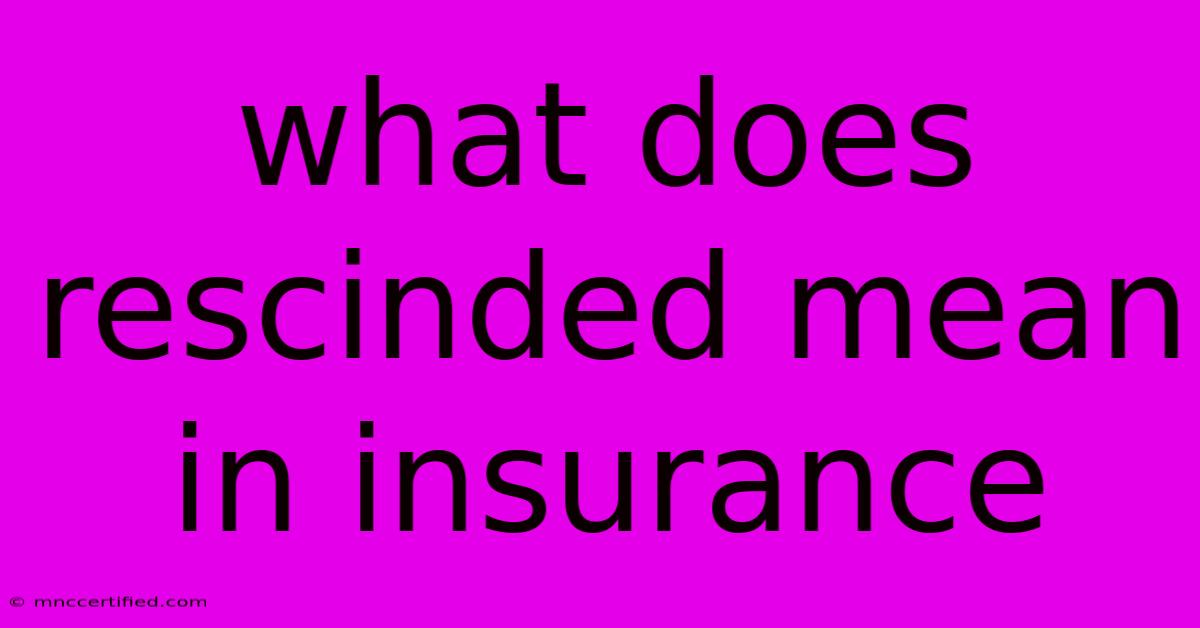What Does Rescinded Mean In Insurance

Table of Contents
What Does "Rescinded" Mean in Insurance?
Ever received a letter from your insurance company stating that your policy has been "rescinded"? This can be a scary experience, as it means your insurance coverage is no longer valid. Understanding what rescission means and why it happens is crucial for protecting your financial well-being.
What is Rescission in Insurance?
In simple terms, insurance rescission means the insurance company cancels your policy and declares it void retroactively. This means the policy was never valid from the beginning, and you're not covered for any claims that happened during the time you thought you were insured.
Imagine you bought a car and were assured it was in excellent condition. Later, you find out the car was a lemon and the dealer knew it all along. The dealer might rescind the sale, meaning you never owned the car legally in the first place. Insurance rescission works similarly.
Reasons for Rescission
Insurance companies have the right to rescind policies under specific circumstances, usually involving material misrepresentations or fraud during the application process. Here are some common reasons:
- Misrepresenting information on your application: If you intentionally omitted crucial details or lied about your health, driving history, or property details, the insurer can argue that your policy is void.
- Hiding information: Even if you didn't intentionally lie, failing to disclose important information that the insurer should have known can also lead to rescission.
- Fraudulent claims: If you submit a fraudulent claim, the insurer can rescind the policy for the entire period it was in effect.
- Failing to pay premiums: While this typically results in policy cancellation, insurers may choose to rescind the policy in some cases.
Impact of Rescission
The impact of rescission can be severe:
- No coverage for past claims: You'll be responsible for any claims filed during the time you were insured, even if you thought you had coverage.
- Financial burden: You'll be left without insurance and may face significant financial hardship if you experience a covered event.
- Difficulty obtaining new coverage: Your insurance history will be affected, making it harder to get new insurance at affordable rates.
How to Avoid Rescission
Here are some steps to take to minimize the risk of rescission:
- Be honest and accurate on your application: Provide complete and truthful information about your health, driving history, property, and any other relevant details.
- Read the policy carefully: Understand the terms and conditions, especially those related to rescission and what constitutes misrepresentation.
- Keep records: Retain all documents related to your insurance application, including any communication with the insurer.
- Consult an insurance professional: Seek expert advice before applying for insurance and during the policy process.
Rescission is a serious matter with significant consequences. Understanding the reasons for rescission and taking proactive steps to avoid it can help you protect your financial well-being and ensure you have the coverage you need.

Thank you for visiting our website wich cover about What Does Rescinded Mean In Insurance. We hope the information provided has been useful to you. Feel free to contact us if you have any questions or need further assistance. See you next time and dont miss to bookmark.
Featured Posts
-
James Mc Cleans Anthem Stand At Wrexham
Nov 10, 2024
-
Wta Finals Gauff Triumphs Zheng Finishes Second
Nov 10, 2024
-
Insurance Companies Hutchinson Kansas
Nov 10, 2024
-
Freight Broker Insurance Requirements
Nov 10, 2024
-
Minnesota Vs Rutgers Football Free Live Stream Guide
Nov 10, 2024